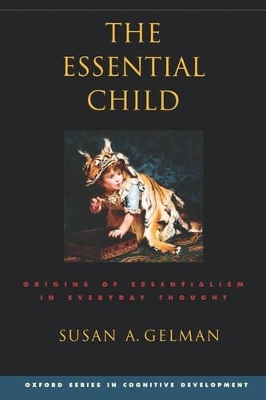
The Essential Child
Oxford University Press Inc (Verlag)
978-0-19-518198-2 (ISBN)
Essentialism is the idea that certain categories, such as "dog," "man," or "intelligence," have an underlying reality or true nature that gives objects their identity. Where does this idea come from? In this book, Susan Gelman argues that essentialism is an early cognitive bias. Young children's concepts reflect a deep commitment to essentialism, and this commitment leads children to look beyond the obvious in many converging ways: when learning words, generalizing knowledge to new category members, reasoning about the insides of things, contemplating the role of nature versus nurture, and constructing causal explanations. Gelman argues against the standard view of children as concrete or focused on the obvious, instead claiming that children have an early, powerful tendency to search for hidden, non-obvious features of things. She also attacks claims that children build up their knowledge of the world based on simple, associative learning strategies, arguing that children's concepts are embedded in rich folk theories. Parents don't explicitly teach children to essentialize; instead, during the preschool years, children spontaneously construct concepts and beliefs that reflect an essentialist bias.
Essentialist accounts have been offered, in one form or another, for thousands of years, extending back at least to Aristotle and Plato. Yet this book is the first to address the issues surrounding essentialism from a psychological perspective. Gelman synthesizes over 15 years of empirical research on essentialism into a unified framework and explores the broader lessons that the research imparts concerning, among other things, human concepts, children's thinking, and the ways in which language influences thought. This volume will appeal to developmental, cognitive, and social psychologists, as well as to scholars in cognitive science and philosophy.
Susan A. Gelman is the Frederick G. L. Huetwell Professor of Psychology at the University of Michigan. She has authored more than one hundred publications on language and cognitive development and has received numerous honors and awards, including a J.S. Guggenheim Fellowship, a Distinguished Scientific Award from the American Psychological Association for Early Career Contribution to Psychology, and a Boyd McCandless Young Scientist Award from Division 7 of the American Psychological Association. She also serves on the editorial board of several journals. Her research has been funded by the National Institutes of Child Health and Human Development, the National Science Foundation, and the Spencer Foundation.
PART I: THE PHENOMENA ; PART II: MECHANISMS OF ACQUISITION ; PART III: IMPLICATIONS AND SPECULATIONS
| Erscheint lt. Verlag | 12.5.2005 |
|---|---|
| Reihe/Serie | Oxford Series in Cognitive Development |
| Zusatzinfo | numerous tables, figures, one illustration and 4 halftones |
| Verlagsort | New York |
| Sprache | englisch |
| Maße | 155 x 234 mm |
| Gewicht | 558 g |
| Themenwelt | Geisteswissenschaften ► Psychologie ► Allgemeine Psychologie |
| Geisteswissenschaften ► Psychologie ► Entwicklungspsychologie | |
| Geisteswissenschaften ► Psychologie ► Verhaltenstherapie | |
| ISBN-10 | 0-19-518198-0 / 0195181980 |
| ISBN-13 | 978-0-19-518198-2 / 9780195181982 |
| Zustand | Neuware |
| Informationen gemäß Produktsicherheitsverordnung (GPSR) | |
| Haben Sie eine Frage zum Produkt? |
aus dem Bereich


